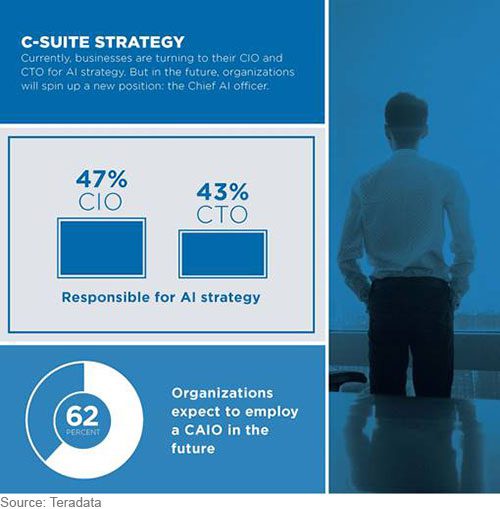Four out of five, or 80 percent of businesses are already running some form artificial intelligence (AI) in production, according to a recent survey of 260 large enterprises sponsored by analytics specialist Teradata and conducted by Vanson Bourne.
And for many organizations, it may be the tip of the iceberg.
Forty-two percent of respondents felt there was plenty of room for more AI implementations across their businesses, according to Teradata’s State of Artificial Intelligence for Enterprises report (PDF). Thirty percent plan to increase their AI investments in the next 36 months.
Although the corporate circles are bullish on AI, there’s reason for proceeding cautiously. Not only is AI rapidly entering into the business IT mainstream, so are its challenges.
Businesses that are harnessing AI in a bid to boost sales are struggling to enhance product innovation (50 percent) and customer service (46 percent). Forty-two percent of respondents reported difficulties in getting AI to play well with their supply chains and operations.
Most organizations (90 percent) said they expect to run into “significant barriers to adoption,” stated the report. Some view a lack of sufficient IT infrastructure (40 percent) and skilled in-house workers (34 percent) as hurdles. A third said today’s AI solutions aren’t quite ready for primetime.
Meeting and overcoming those challenges may be worth the effort.
For every dollar invested AI today, enterprises expect a return on investment (ROI) of $1.23 within the next three years. Five years out, that figure rises to $1.99 before reaching $2.87 in the next 10 years.
Those gains may prove elusive for some firms, however. Nearly a third (30 percent) of respondents said their organizations weren’t spending enough on AI.
In terms of executive leadership, AI will also have a profound impact on many organizations’ C-suites.
“Today, AI strategy is typically under the scope of a CIO or CTO, but, in the near future, the majority of businesses surveyed plan to install a dedicated Chief AI Officer to lead the effort,” stated the report. Sixty-one percent of respondents said they plan to install a chief AI officer sometime in the future.
There’s also some good news for AI vendors. Since AI professionals may be hard to come by, many of those tech leaders will lean on IT providers to help flesh out their AI strategies.
“Enterprises also realize that in-house talent that can harness AI is going to remain in short supply. So, businesses plan to create AI-driven opportunities and wins instead through vendors that will help them buy, build and deploy AI solutions,” the report found.
Pedro Hernandez is a contributing editor at Datamation. Follow him on Twitter @ecoINSITE.



